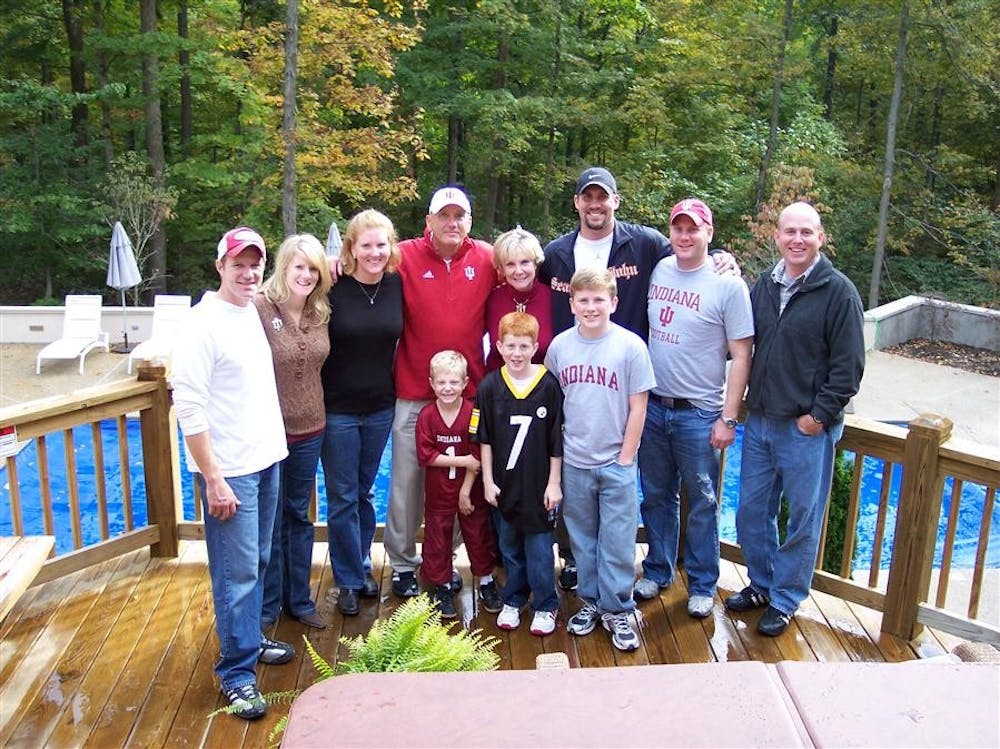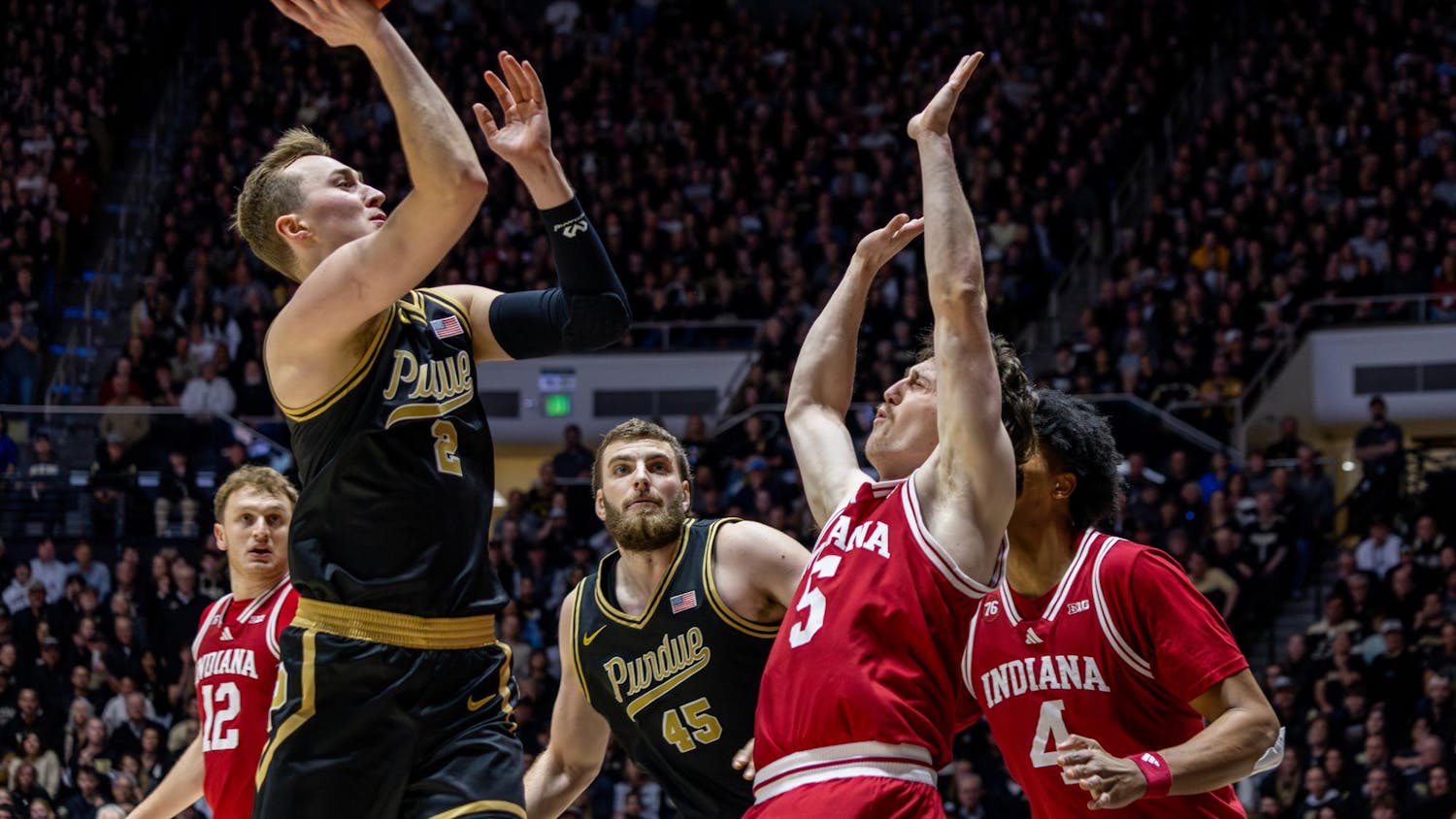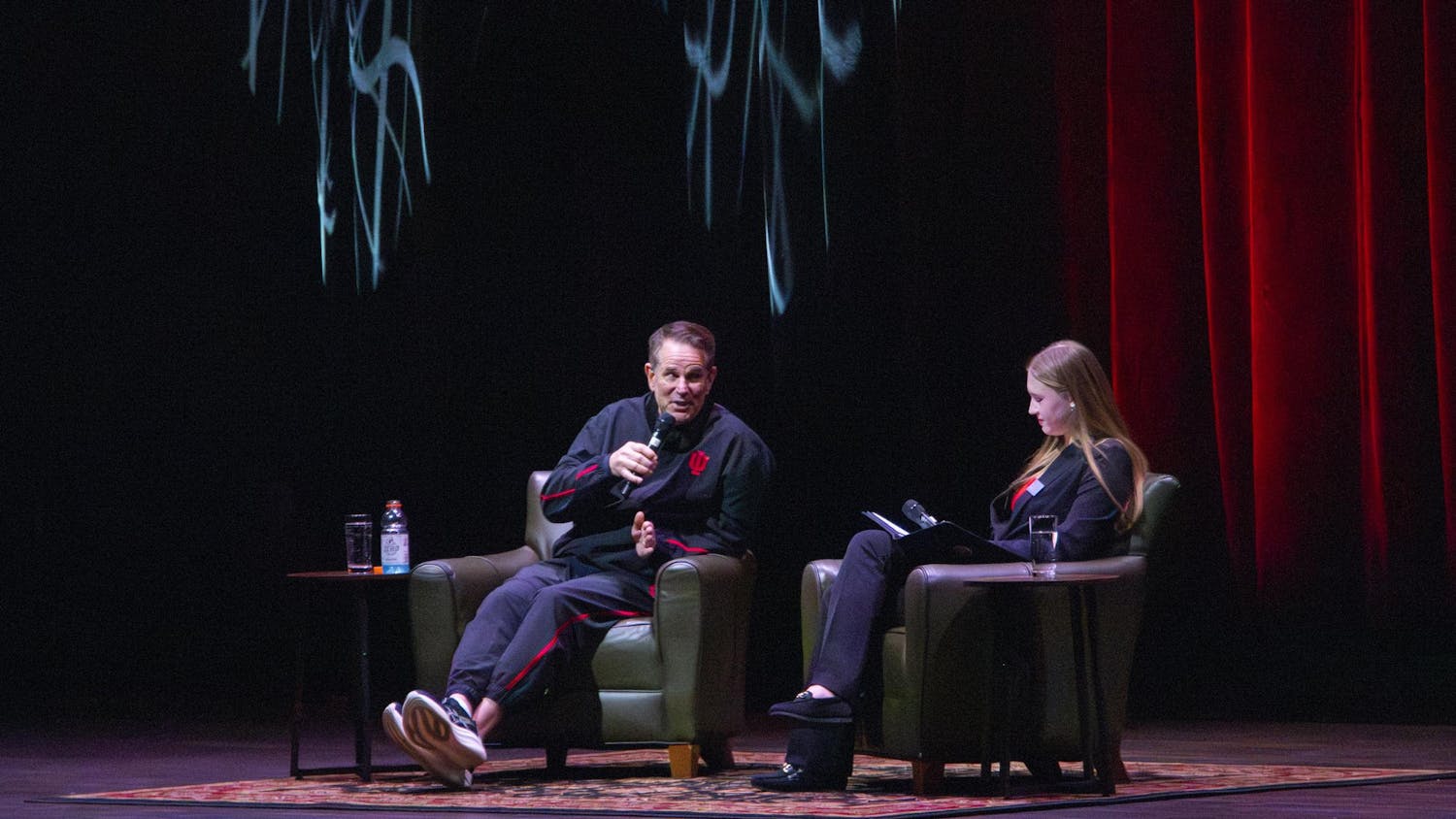On a foggy Bloomington night in June, two beacons shine brightly through the mist. They are the towers that form the North End Zone complex at Memorial Stadium, and they serve as just that: a memorial to a man who has been absent for five years.
A man who never saw the towers built.
Nearly four miles away, another monument stands for the same man. It’s much shorter, rising only halfway up one’s thigh. It’s tucked into a far corner of the Valhalla Memory Gardens, just feet from a cracked concrete path and half-covered in shade from a nearby tree.
The black letters on it clearly stand out from the granite — “Terry Hoeppner: August 19, 1947-June 19, 2007.”
“Can you see it?”
Hoeppner’s vision for IU football began to take shape in 2005 when he accepted the head coaching job for the Hoosiers. It was the only job that could lure him away from being at the helm of Ohio’s Miami University Redhawks, and he knew he had some work to do.
IU was a school that put basketball first, and some were even disrespectful of the football program.
During the summer of 2005, Hoeppner caught wind that leaders at student orientation had been making jokes about the football team. The next day, at 7:30 a.m., Hoeppner was in attendance at their meeting, speaking about his goals for the program and why he needed students’ support.
“Those are the kind of things that ended up endearing him to people,” Jane, his wife, said. “Because he wasn’t afraid to speak up for his team, for his program, for all of those things that he had a vision for.”
His sights extended from the student body to improving the facilities at Memorial Stadium, which many saw as a lackluster stadium for Big Ten football.
Early in his IU tenure, a high school football recruit visited IU. While he was standing on the field and talking with Hoeppner, Hoeppner turned toward the north end of the stadium, where he was already envisioning what would eventually become the North End Zone complex.
“Can you see it?” he asked the recruit. “Because I can.”
Hoeppner described it in detail: towers rising high above the field, shining with glass and an enormous IU logo.
When James Hardy — who had actually come to IU with a basketball scholarship — worked out with the football team, Hoeppner had a vision for him.
Hoeppner watched film of catches Hardy had made. He was going to make Hardy a football player.
“He’s one of my best friends,” Hardy said. “He taught me things about life that you’re supposed to learn from your father. Unfortunately, I never did, so within the time period that I knew (Hoeppner), he respected me for a lifetime.”
Hardy went on to start as wide receiver and set the all-time record for receptions
at IU.
Hoeppner’s 2005 team finished 10th in the Big Ten, but he was confident they would improve. On Christmas Eve 2005, however, Hoeppner was bothered by a headache and had it checked out. The tests revealed a tumor in his right temple. He had it removed Dec. 27, 2005.
During the 2006 season, continuing health concerns kept him from consistently being on the sidelines with the Hoosiers and confined him to his house.
One night, while sitting in his living room watching television from his recliner, he turned to his wife sitting nearby on the plush floral couch and apologized.
He said he was sorry they hadn’t had the opportunity to spend time together in a low-key setting, like sitting in front of their TV. He was constantly working and watching tape and scouting opponents, but now, he had time to spend lounging in his living room.
“We wouldn’t have done it any differently had we had a chance to do it over again,” Jane said. “I think he was just feeling kind of nostalgic.”
Even through the hard times, he wanted to remain strong for his players. One evening, Hardy walked into the locker room. Hoeppner, who was using the wall to support himself as he walked, didn’t notice Hardy.
“Hey, Coach!” Hardy yelled.
Hoeppner quickly took his hand off the wall, turned and put a smile on for Hardy, pretending nothing was out of the ordinary.
“That’s when I knew it was worse than what I thought,” Hardy said.
Months later, before the start of the 2007 season, host Dave Revsine of the Big Ten Network would ask Jane when it was clear to her that her husband might not survive the cancer.
“I guess June 19,” she answered.
June 19
In March 2007, it was clear Hoeppner wouldn’t be able to coach the team in the upcoming season. As his replacement, he chose Bill Lynch.
The two had coached against each other for their entire professional careers; Lynch coached at Butler while Hoeppner coached at Franklin College. Lynch coached at Ball State University while Hoeppner was at Miami.
When Hoeppner took the job at Indiana, he called Lynch out of the blue and lured him away from his job at DePauw to join him.
“You had to know him,” Lynch said. “He was just such a positive guy, and he had a personality that he was going to beat anything.”
During summer conditioning, Hoeppner’s condition was getting worse.
June 19, 2007, was set to be a big day for the Hoeppner and Hoosier families. The ground-breaking ceremony for the North End Zone complex was to take place.
Hoeppner’s vision was finally physically coming to fruition. He never had a chance to see it happen.
Early in the morning of June 19, Hoeppner died.
Immediately, Athletics Director Rick Greenspan decided to cancel the ground ceremony. Even in her grief, however, Jane insisted otherwise.
“I was thinking in my mind, ‘He would be doing it if he was here,’” Jane said. “‘Since he can’t and I can, then I will do that,’ and there was not ever any question about not doing that.”
Hoeppner’s passing was a shock to many of those in his life, especially Hardy.
“Yes, I thought he was going to beat it,” Hardy said. “He helped me beat my odds, and he was there for me, so of course he’s going to be there and he’s going to beat it for his own life.”
Hoeppner’s service drew visitors from around the nation. Sean Payton, who coached with Hoeppner at Miami and was the head coach of the New Orleans Saints at the time of Hoeppner’s death, was there. Current IU Coach Kevin Wilson, who had also coached with him at Miami, arrived to pay his respects.
“Even as Terry was fighting cancer and he was battling in his last years,” Wilson said, “he was trying to help me out with a couple jobs and help me as an assistant coach get in line to be a head coach. He was always there for me.”
In front of Wilson and thousands of attendees, both Hardy and Jane, among others, spoke. Hardy wondered aloud what he was going to do without his mentor.
Jane was never much of a public speaker, but she figured that if she could make it through the loss of her husband, she could make it through a few minutes at the podium.
“We are going to play in a bowl game,” Jane assured the crowd. “And Coach Hep is going to be there with us.”
Unexpected gifts
Five months later, IU was on the verge of that bowl game. Kicker Austin Starr trotted onto the field at Memorial Stadium during the final season game against Purdue. The teams were tied at 24 with 35 seconds remaining, and he had to kick a daunting 49-yard field goal.
Starr had swum in Hoeppner’s pool and played with his grandchildren. He had also been disappointed that he was never a member of a senior class when Hoeppner was the head coach.
Now, he had a chance to both beat Purdue at home and win IU’s seventh game of the season. He took a deep breath, and when the snap was perfect, he made sure the kick was just as perfect. It sailed through the uprights, and IU beat Purdue, 27-24, and advanced to a bowl game.
Cameras from the Big Ten Network captured the jubilee. Students cheered wildly. Jane, on the sidelines, turned every which way to receive hugs from those near her.
“It was fitting in a lot of different ways,” Jane said. “It was fitting because we were close to Austin, and we were so happy for him. It was fitting that it was just a magical night. It was just unbelievable.”
It was a gift to the Hoosiers and the Hoeppners. Coach Hoeppner had many phrases and mantras, and one of them was “Unexpected gifts at unexpected times.”
“That’s what you’re all about,” Jane would joke with him, “because you don’t remember the birthdays and the anniversaries and things you’re supposed to remember.”
Whatever the reason, Hoeppner made a habit of giving gifts at unexpected moments. When Hardy thought he was destined to play basketball, Hoeppner gave him a chance to play football.
When Lynch was happily coaching at DePauw, Hoeppner gave him a chance to coach in the Big Ten. When he saw the need, Hoeppner gave the University a large gift in his vision for the North End Zone complex.
On the first Saturday of the 2007 season — the first game without Hoeppner — the doorbell rang at the Hoeppner house. Jane, who was getting ready to head to the stadium, answered the door.
In front of her was a man with a bouquet of flowers. Confused, Jane accepted them and took them inside. The note was from one of Hoeppner’s former players at Miami, Shean Williams, now an attorney in Atlanta.
“A wise man once told me, unexpected gifts at unexpected times,” the card read.
“Make your plans succeed”
Five years later, Jane sits on her couch, recounting stories from meeting Terry at Franklin College to learning to speak in public after his death. Behind her is a pillow with a Bible verse written on it.
Psalm 20:4-5. “May he give you the desire of your heart and make all your plans
succeed.”
Hoeppner’s plans succeeded, even though he wasn’t around to see all of it.
Hardy became one of the best football players in IU history and has a tattoo of Hoeppner on his arm, with a question eternally etched in his skin — “Where would I be without Hep?”
Wilson, whom Hoeppner wanted to be made a head coach, now has that job. He coaches the Hoosiers on the same field Hep did.
“There’s a good deal about being a head coach and being at Indiana, and if there’s one bad thing, it’s because Terry Hoeppner’s not the head coach here,” Wilson said.
And that North End Zone complex became a reality.
“I drive by that stadium and I look at that North End Zone and I think, ‘Wow,’” Jane said. “It’s what he saw.”
5 years after his death, Coach Hep remembered for vision

Get stories like this in your inbox
Subscribe



